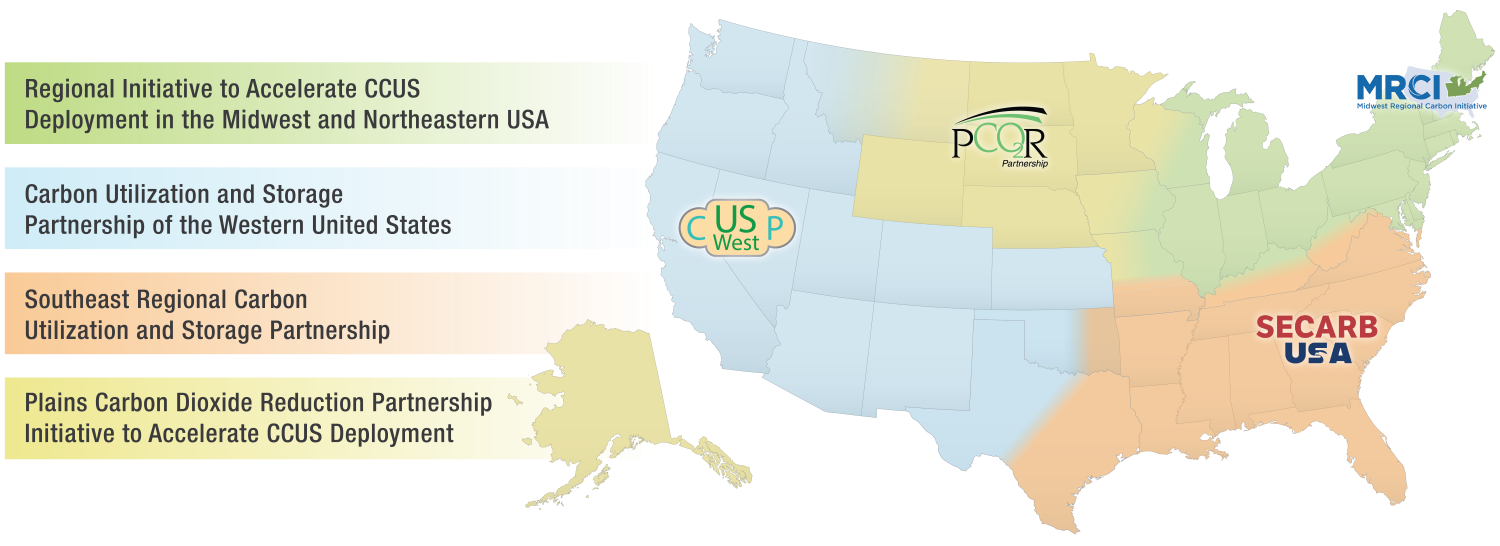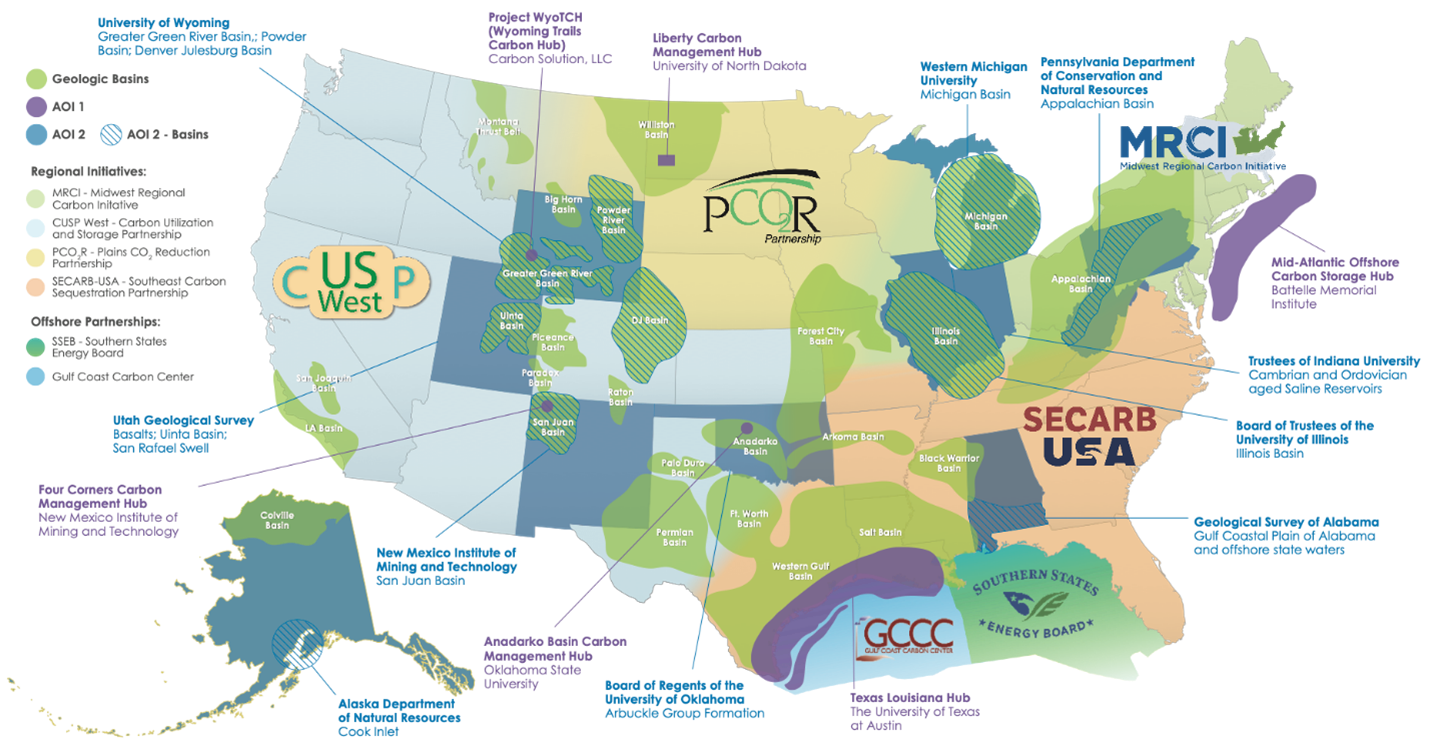San Juan Generating Station. Photo courtesy of NMIMT’s Carbon Utilization and Storage Partnership of the Western United States.
Regional Initiative Overview:
The U.S. Department of Energy’s (DOE) Carbon Sequestration Partnerships (RCSP) Initiative (2003-2018+), was highlighted by 6 successful large-scale geologic carbon storage demonstrations (over 11 million metric tons of carbon dioxide [CO2] safely stored collectively) and the establishment of regional teams possessing first-hand experience in conducting such projects.
Building on RCSP successes, DOE competitively awarded four new research and development (R&D) projects in 2019, collectively known as the “Regional Initiatives (RIs)”. These four projects have a common overall objective – to identify and address challenges facing commercial deployment of carbon capture, utilization, and storage (CCUS). Each of the four projects is charged with providing a broad range of technical, procedural, and outreach assistance to CCUS efforts across a rather broad region of the United States, as listed below:
- Midwest Regional Carbon Initiative - Northeastern/Mid-Atlantic U.S. and Illinois Basin
- Southeast Carbon Sequestration Partnership – Southeastern U.S.
- Plains CO2 Reduction Partnership – Great Plains Region
- Carbon Utilization and Storage Partnership – Southwestern and Western U.S.
The following four activities are common to all four RI projects:
- Addressing Key Technical Challenges
- Facilitating Data Collection, Sharing, and Analysis
- Evaluating Regional Infrastructure
- Promoting Regional Technology Transfer.
The Regional Initiative effort also supports DOE-Fossil Energy and Carbon Management (FECM) goals by:
- Providing states and stakeholders with technical information that underpins policy decisions
- Assisting project developers with the management of pore space and property rights
- Identifying the data needs for the completion of the Underground Injection Control (UIC) Class Six (VI) permitting process.
Overall, the RI effort is providing stakeholders in each region with crucial information to fill the cost and performance knowledge gaps as needed to enable deployment of carbon management activities, including CCUS for industrial and power sector emissions mitigation and CO2 removal. The five-year performance period of these projects is scheduled to end in September 2024.
To help address the rapidly increasing demand for technical assistance, DOE enhanced the ongoing Regional Initiative effort in 2023 by selecting six new projects under Area of Interest 1 of DE-FOA-0002799, whose objective is to provide technical and community engagement assistance to developers of specific, well-defined, large-scale storage facilities or regional carbon management (CM) hubs. The type of assistance provided by these projects is similar in nature to the assistance provided by the Regional Initiatives, except that it is focused on more localized needs and includes a greater emphasis on community engagement as well as diversity, equity, inclusion, job creation, and economic justice issues. These projects fill a critical short-term need for data collection/ analysis/ sharing as well as an increased level of technical and community engagement at the more localized scale of a single storage facility or CM hub rather than over a broad region.
Also in 2023, DOE supported the Regional Initiative effort by selecting 10 other projects under Area of Interest 2 of DE-FOA-0002799, that are compiling and sharing, at the State level, geologic data, resource assessments, geologic modeling, and community/stakeholder information required to accelerate the development of large-scale carbon storage facilities in that specific State.

Map of the Four Original Regional Initiatives.

Regional Large-scale Storage Hubs and State-Level Data Collection & Sharing
| Regional Initiative Project Landing Pages |
|---|
| Southeast Regional Carbon Utilization and Storage Partnership (SECARB-USA) |
Southern States Energy Board |
| FE0031830 |
| Regional Initiative to Accelerate CCUS Deployment in Midwestern and Northeastern USA |
Battelle Memorial Institute |
| FE0031836 |
| Carbon Utilization and Storage Partnership of the Western United States |
New Mexico Institute of Mining and Technology |
| FE0031837 |
| Plains CO2 Reduction Partnership Initiative to Accelerate Carbon Capture, Utilization, and Storage Deployment |
University of North Dakota Energy and Environmental Research Center |
| FE0031838 |
| Wyoming Trails Carbon Hub: Developing a Roadmap for a Sustainable Carbon Hub |
Carbon Solutions, LLC |
| FE0032360 |
| Texas Louisiana Carbon Management Community (Txlacmc) |
University of Texas at Austin |
| FE0032361 |
| Anadarko Basin Carbon Management Hub |
Oklahoma State University |
| FE0032362 |
| CUSP: Four Corners Regional Initiative |
New Mexico Institute of Mining and Technology |
| FE0032363 |
| Characterization of Subsurface Opportunities to Accelerate Carbon Capture, Utilization, and Storage (CCUS) in Indiana |
Indiana University |
| FE0032365 |
| A Play-Based Exploration of Carbon Capture and Storage (CCS) Potential of the Illinois Basin |
University of Illinois |
| FE0032366 |
| Utah Statewide Carbon Storage Assessment: Geological Data Gathering, Analysis, Sharing, and Engagement |
Utah Department of Natural Resources |
| FE0032367 |
| Advancing Carbon Capture, Utilization and Storage (CCUS) in the Michigan Basin |
Western Michigan University |
| FE0032368 |
| Subsurface Seismic Structural Characterization of the Hogback Monocline and Thermal Characterization of the San Juan Basin, New Mexico |
New Mexico Institute of Mining and Technology |
| FE0032369 |
| State of Alaska Initiative to Create a Statewide Carbon Capture, Utilization, and Storage (CCUS) Database |
Alaska Department of Natural Resources |
| FE0032370 |
| Prairie Horizon Carbon Management Hub |
University of North Dakota |
| FE0032371 |
| Wyoming Class Six (VI) Site Characterization Database |
University of Wyoming |
| FE0032372 |
| Alabama Carbon Storage: Data Sharing and Engagement |
Geological Survey of Alabama |
| FE0032373 |
| Oklahoma Geological Survey Coordination of Mid-Continent Carbon Management Business |
University of Oklahoma |
| FE0032374 |
| Regional Initiative to Accelerate Carbon Capture, Utilization, and Storage Deployment: The Central Appalachian Partnership for Carbon Storage Deployment |
Pennsylvania Department of Conservation and Natural Resources |
| FE0032394 |
Explore the Site





